The second part of my account of how I, as an Evangelical Protestant journeying to the Catholic Church, grappled with sola scriptura. I decided to split the post into three, so there is still more to come! Part of my ongoing conversion story.
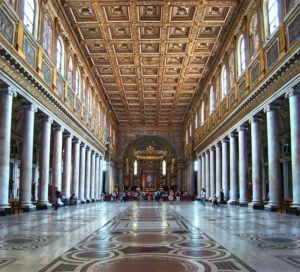
Basilica di Santa Maria Maggiore, Roma (Wikimedia)
So this idea of authority — which I had never really thought much of as a Protestant — proved to be a critical one. Who has the authority to interpret Scripture? If anyone had asked me that as a Protestant, I would have answered that I did. I don’t think this is the right answer, understanding what I do now about about Protestant theology: “Scripture interprets itself” seems to be the appropriate response. Only it didn’t for me. As I read and studied Scripture on my own, praying for the Holy Spirit’s guidance, I strove to find my way to a correct understanding of biblical doctrine and theology — only I never made much headway. When faced with competing claims to truth from different denominational camps, based on different, apparently valid interpretations of the same scriptural passages, I struggled to come to any confident conclusion.
As a Protestant, I still very much felt that Scripture was the only authoritative source of divine truth — the only place we could go to find divine revelation. It is the Word of God. But as an academic, I was coming to understand the idea of authority in perhaps a different way than many of my Evangelical brethren.
An argument from history
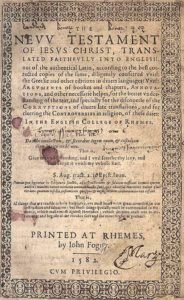
Douay-Rheims New Testament (1582) (Wikimedia)
As I studied history in school, I came to think more about sources of authority. Obviously, in terms of the Christian faith, Scripture, the Holy Bible, was the primary source, the authoritative Word of God. But — at least in the Evangelical Protestant camps I grew up in — it was common to treat it as the only source: as if, if something is not detailed explicitly in Scripture, it cannot possibly be true. This was applied not only to matters pertaining to Christianity and the Church, but to all matters. It was, of course, applied unevenly, and used more as a cudgel to reject facts and evidence the believer happened not to care for than for any universal standard of truth.
As a budding historian, I was aggravated by this logic. Just as in history, there were secondary sources, of a different degree of authority but nonetheless valuable, there were numerous other sources — historical sources, the writings of the earliest Christians after the New Testament or even of secular authors; scientific sources, evidence scientists had observed and that we ourselves could observe from nature — that could add to our knowledge about our world and even about our faith. The Bible being the authoritative Word of God did not demand that it be the only source of truth.
The Bible was God’s Word to us; but it was also an historical document. The Bible could shed light on Christian history; but other, historical sources could also shed light on Christian history. The Bible, in terms of history, only gave a brief glimpse at the origins of Christianity; other sources could certainly tell the story of what happened next, where the Bible could not. When I journeyed to Rome as a student, I was fascinated by the claims that the tombs of the Apostles Peter and Paul were there. The truth of these claims could be supported from history and archaeology. But I encountered Christians who were prepared to reject such claims out of hand, on the simple grounds that “it wasn’t in the Bible.”
So already, years before I even approached Catholicism, I was discontent with the way some Evangelicals applied sola scriptura — in an unintellectual opposition to observable fact. I was similarly disgruntled with the literalistic reading of Scripture espoused by many Evangelicals, who sought to read the words of Scripture as statements of bald fact and not the literary forms — poetry, liturgy, allegory — that they certainly contain. I witnessed so many nasty and fruitless arguments quibbling over young-earth Creationism, the biblical Flood, points of historical or narrative accuracy — when none of these things had any bearing at all on the spiritual truths contained in Scripture. They only detracted from our understanding rather than adding to it, divided Christians rather than united them, and falsely pitted Christianity against science in a way that made people of faith a laughingstock to the secular world. There was no reason to use “sola scriptura” as a denial of the observable facts of history or science, of truth we could glean from other sources. God gave us Scripture to reveal His truth, not to blind our eyes to it.
Sources of authority
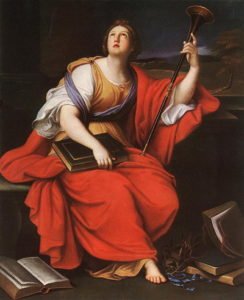
Pierre Mignard, The Muse Clio (1689) (Wikimedia)
The thing that still bothered me deeply about Catholic claims was the claim that the Church was the sole authentic interpreter of the Word of God — in other words, the Church could tell believers the right way to understand Scripture! As a Protestant, I felt a closely-held prerogative to interpret Scripture for myself. Looking back, I felt a liberty to read, interpret, and define the meaning of Scripture for myself that seems to contradict what Protestants actually teach about the perspicuity of Scripture — supposing that Scripture has one meaning that ought to become clear with effective study — but in truth seems to reflect the way many Protestants actually read Scripture — with the ultimate authority being one’s own individual interpretation.
How dare the Church insist on interpreting Scripture for me! Didn’t Luther’s focus on “Scripture alone” originate to combat the tyranny of the Church, and its imposition of “unbiblical” doctrines? What was to keep the Church today from dictating to believers that Scripture said something entirely different than what it actually said? This, coming from my Protestant formation, is exactly what I presumed she did. This, up until the time I discovered the Church for myself, was my foremost, most easily vocalized objection to the Catholic Church.
It was the single point I raised the fateful day I ran into my friend Audrey at the library. Her response was simple, clear, and disarming. She was perhaps the only person in my life who could have addressed this particular issue in this particular way — the way that made perfect sense to me and cut through all my defenses. It was the answer all the years of my journey had been preparing me for.
“I see it like authority for a historian,” she said. “We base our arguments on the authority of those who have written in the past. The closer a witness is to the event, the more valuable it is in understanding how that event was understood by contemporaries. And each generation builds on the authority of those who have written before, and as they reflect on those interpretations, they gain a deeper understanding of the truth. The Catholic Church has 2,000 years of authority behind her interpretations of Scripture — of trusted, respected, and authoritative voices who have spoken on the matter.“
And there it was. Of course the Catholic Church has an authoritative interpretation: By relying on the ancient witnesses of the past, according to a scholarly, historical method, the Church’s interpretations of Scripture become by default more authoritative than my personal, unaided interpretation alone. I know some Greek and a little Hebrew, but those are not languages that I understand natively. I was not personally acquainted with the Apostles or with their disciples or with the historical and theological context of the Early Church and the faith they received. The Church Fathers — whom I had respected for so long — were. It was on they that the authority of the Catholic Church’s interpretation of Scripture was, at least in part, based.
It is true that some Protestants do consult the Church Fathers when interpreting Scripture — but I had never encountered this as an Evangelical. In general, most Protestants I have read consider the Fathers to be merely another consulting opinion, of no more inherent value than their own private interpretation. They dismiss the idea that anyone other than themselves has inherent authority in interpreting Scripture. If the Fathers seem to agree with their foregone conclusions, they cite them — piecemeal and without context — for support. If the Fathers do not, they are quick to dismiss them as wrong or mistaken (but usually not as apostates or heretics). It is true, of course, that the Church Fathers can be wrong; but they certainly deserve a degree of respect and deference beyond what most Evangelicals give them, both on account of being closer to the original sources and of the high regard in which they have been held, both in their own times and over the centuries.
There is still more to come!


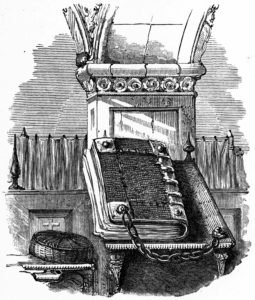
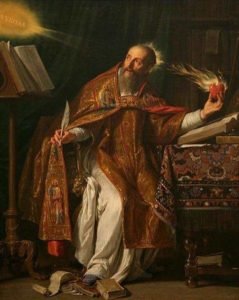
Pingback: Grappling with Sola Scriptura, Part 3: An Authoritative Church | The Lonely Pilgrim
Pingback: Grappling with Sola Scriptura, Part 1: Paralysis | The Lonely Pilgrim
Pingback: The Claim that Catholics “Cannot Interpret Scripture for Themselves” | The Lonely Pilgrim